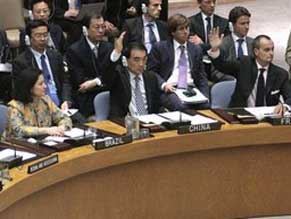|
World Jewish News

Photo by AP.
|
JPost about sanctions: Too little, very late
10.06.2010, International Organizations The full half of the glass is that the international community has finally united to impose further sanctions on Iran. The empty half is that the package approved by the UN Security Council does not remotely constitute the crippling sanctions which might just have exerted a sobering effect on Teheran as it proceeds toward a nuclear weapons capability.
The sanctions voted through on Wednesday lack the bite of the package that was initially proposed. They were watered down, over protracted negotiations, to enlist the support of reluctant powers like Russia and China, with the goal of thereby creating the semblance of an international consensus. But what Moscow and Beijing proved willing to swallow is so diluted a package that Iran’s President Mahmoud Ahmedinejad must be chuckling to himself, despite his outward show of sound and fury.
Primarily lacking from the sanctions concoction is anything that will impact Iran’s energy industry, when what was most critically needed was a ban on the export to Iran of refined petroleum products. Although Iran is one of the world’s prime sources of crude oil, it has never developed the adequate capacity to process its abundant black gold. Hence Iran is heavily dependent on foreign supplies. The prohibition of such supplies could dramatically weaken the ayatollahs’ regime, since it would directly impact the citizenry and would likely trigger a popular backlash. Three years ago, gas stations throughout Iran were set alight by angry protesters rioting against price hikes at the pump.
Sanctions-generated fuel shortages would have meant deactivated vehicles, electricity blackouts, industrial and commercial paralysis. That would have sent a potent message that the world means business when it comes to thwarting Teheran’s nuclear ambitions.
A parody of sanctions, by contrast, makes a laughingstock of the international community. The best hope now is that the US and EU will quickly impose tougher sanctions of their own.
EVEN THE deficient sanctions that were approved at the UN aren’t likely to be stringently enforced.
If we ignore the predilection of some private concerns in the free world to keep trading with Iran regardless of its incitement and its aggression, we may assume that most of the West – i.e. the US and EU – will adhere to the new strictures and that whatever violations come to the fore will be dealt with.
Elsewhere, however, reluctant sanctions-backers like Russia and China are less likely to religiously abide by them. The situation in the radical segments of South America, where Ahmedinejad enjoys an incongruous following, is worse still, as it is throughout much of Asia, particularly the Muslim components. Worst of all are Iran’s allies in this region, beginning with Syria and its Lebanese puppet and reaching all the way to transformed Turkey (which voted against Wednesday’s package, along with Brazil, while Lebanon abstained).
Breaking and evading these sanctions ought to be a breeze for Ahmedinejad. A full year after Iran’s deceptive elections, which spurred countrywide demonstrations, he may be less popular but his position is stable. After the regime brutally quashed his opposition, it is very doubtful that stunted sanctions will destabilize his hold on power.
None of that will moderate his vehement anti-sanctions rhetoric. Ahmedinejad is putting on an extravagant spectacle of anger and outrage. Domestically, he derives much psychological benefit from appearing like the beleaguered patriotic warrior, facing off against the Zionist-lackey West.
Today’s resourceful and emboldened Iran is a very different entity from the pariah state
it was just a year ago, when credible sanctions would have been far more effective. Teheran has shielded its crucial interests from financial restrictions and its newly bolstered alliances may be valuable in deflecting pressure. The international community missed its best opportunity to apply economic pressure during 2009’s post-election unrest. In the interim, Iran has contracted game-changing deals and made strides toward self-sufficiency.
US Secretary of State Hillary Clinton may speak of Wednesday’s package representing “the most significant sanctions that Iran has ever faced.” But Russia’s Prime Minister Vladimir Putin has been warning against “excessive” measures lest they cause “hardship” in Iran. The subtext is that Russian and Chinese commerce with Iran will proceed all but unhindered.
Wednesday’s sanctions, then, are not the antidote to the Iranian nuclear threat that Israel had hoped for and that the free world so badly needs.
In some ways, they may even exacerbate Israel’s predicament. They will lend the appearance of an international mobilization to curb Iran’s nuclear weapons ambitions, but in actuality will achieve nothing – the worst of all worlds.
By SARAH HONIG
JPost.com
|
|
